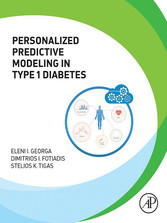Suche
Lesesoftware
Info / Kontakt
Personalized Predictive Modeling in Type 1 Diabetes
von: Eleni I. Georga, Dimitrios I Fotiadis, Stelios K. Tigas
Elsevier Reference Monographs, 2017
ISBN: 9780128051467 , 252 Seiten
Format: ePUB
Kopierschutz: DRM




Preis: 119,00 EUR
eBook anfordern 





